Fundraiser, contests, workshops mark Hunger and Homelessness Awareness Week
Goal set to raise $2 million for students' basic needs
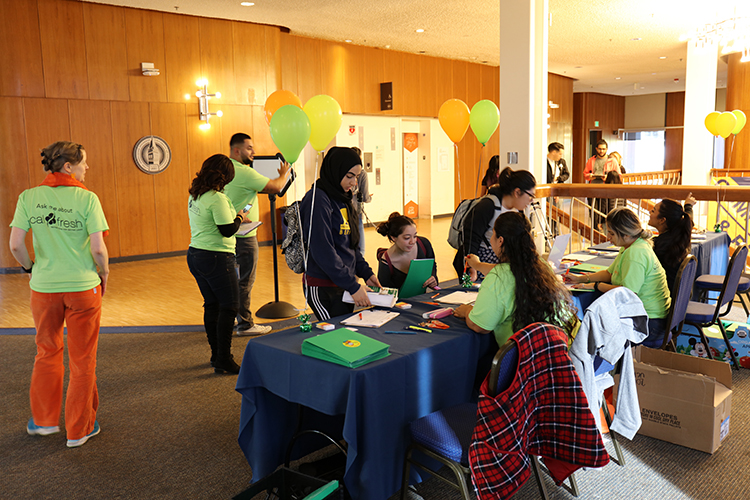
November 13, 2017
Basic needs security. Two years ago, that wasn’t a familiar term on campus.
Instead, food security was the focus, and a model toolkit for students unveiled at Berkeley in 2015 included a food pantry, financial help, a food security website and tips on nutrition and cooking for $5 a day.
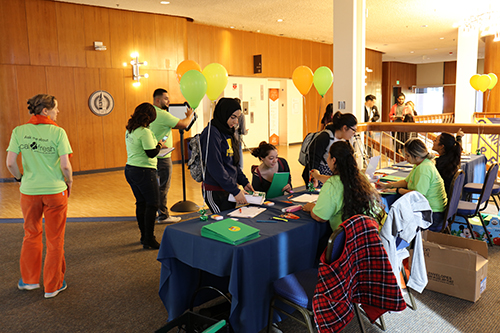
Nearly 200 students showed up at Pauley Ballroom on Sunday, Nov. 12, to apply for CalFresh food assistance. (Photo by Ruben E. Canedo)
But by 2016, hungry students were speaking out about more than skipping meals. They also lacked affordable housing and financial stability. As a result, other needs were suffering — their mental, emotional and physical wellness, and their academic success.
This week, for the first time, not only Berkeley but the entire UC system is observing annual National Hunger and Homeless Awareness Week, Nov. 12-17, making a statement that all students’ basic necessities need attention and asking the public to help support the forward-thinking efforts it has underway.
“Students with all the potential to be successful at Berkeley are struggling and even dropping out, not because of their intellectual capabilities, but because their basic needs aren’t being taken care of. They are too overwhelmed. And it’s getting worse as the Bay Area cost of living increases,” says Ruben E. Canedo, chair of the UC Berkeley Basic Needs Committee.
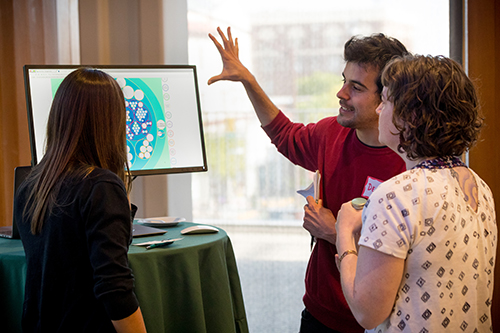
A work in progress, the Berkeley Food Institute’s Foodscape Map is a snapshot of all food-related initiatives on campus. (Photo by Jonathan Fong)
“College campuses can’t resolve hunger and homelessness; these are larger systemic issues in our country, in the economy,” he adds. “But we must help set the tone to address them, to generate awareness with boldness and innovation.”
The week kicked off Sunday with a CalFresh megaclinic in Pauley Ballroom, where nearly 200 students got assistance signing up for a federally funded nutrition program that issues a free debit card for groceries to those who qualify.
A $2 million fundraising campaign for student health and wellness tops the comprehensive list of activities planned this week at Berkeley:
MONDAY, NOV. 13
- Basic Needs Security case competition
Teams of students will be given four days to come up with solutions to problems facing the campus in its quest to help students struggling with hunger and the cost of housing.
-
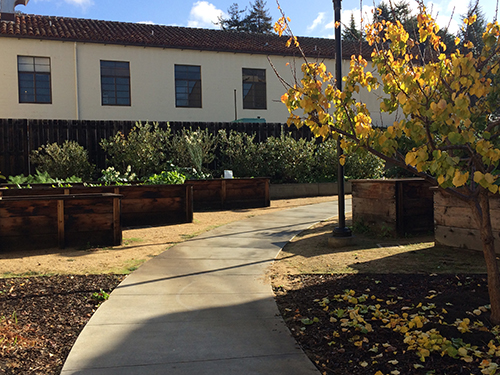
The Clark Kerr Campus Garden is one of several UC gardens tended by Berkeley students, who also contribute produce from the harvest to the campus’s dining halls and food pantry. (UC Berkeley photo by Gretchen Kell)
Campus Gardens Tour, 3-5 p.m.
All are welcome to take a guided tour of several campus gardens. Meet at the Student Organic Garden, at the northwest end of the Oxford Tract and the intersection of Oxford and Hearst streets.
TUESDAY, NOV. 14
- Mental health workshops, Stiles Hall.
Noon-1 p.m. Faculty, staff and administrators are invited to learn how to support student mental wellness and respond to students in crisis.
“The lack of ongoing food or secure housing often has correlations to mental health,” says Tova Feldmanstern, staff and social worker from the campus’s Counseling and Psychological Services, who will lead the workshops.
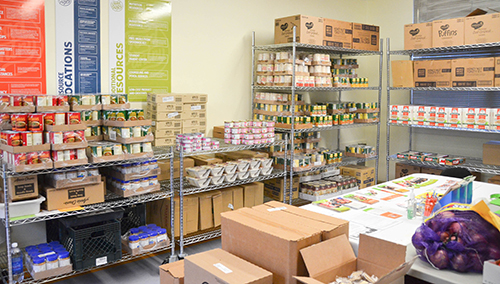
The modest UC Berkeley Food Pantry has had more than 2,200 visits each month for the last two months. (UC Berkeley Food Pantry photo)
“What we can do as faculty and staff is help students recognize the signs of mental distress. And we need to educate ourselves about what students are facing and what resources are here on campus. For example, where is the food pantry? What are the hours? What foods does it offer?”
4-6 p.m. Students will hear a panel of their peers share personal experiences with mental health and basic needs insecurity. They also will learn about mental health resources on campus.
- FAFSA/California Dream Act Application Workshop, Open Computer Facility (OCF) lab, 6-8 p.m.
Students can work on their applications and get questions answered by Financial Aid Office staff. All attendees need an OCF account to log into the computers.
WEDNESDAY, NOV. 15
- Addressing Food Insecurity and Basic Needs Among UC Students: What Can Berkeley Do? Academic Innovation Studio, 117 Dwinelle, 6-7:30 p.m.
Leaders from the UC Berkeley Basic Needs Committee and the UC Nutrition Policy Institute will share with campus instructors and faculty the latest data and strategies to support college students’ basic needs.
- Basic Needs Security Experts Panel, 145 Dwinelle Hall, 7-9 p.m.
Speakers from U.S. Rep. Barbara Lee’s office, the Berkeley Food Institute and the ASUC will talk about their work and how the campus community can fight food insecurity and homelessness.
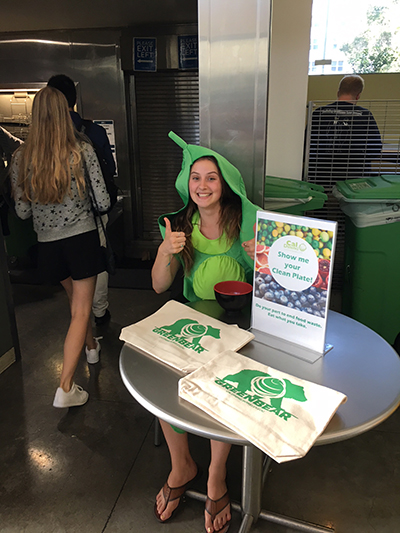
At a previous Cal Dining clean plate promotion, Ella Griffith, student waste reduction coordinator, dressed as a pea to hand out prizes. (Photo by Samantha Lubow)
TUESDAY-THURSDAY, NOV. 14-16
- Cal Dining Weigh Your Waste event, 5-8 p.m., Café 3 and Crossroads dining halls (11/14), Clark Kerr and Foothills dining halls (11/15), and the Clean Plate Promotion, Crossroads (11/16), 5-8 p.m.
Activities for students will include a hands-on how-to on sorting food waste and a promotion to finish all the food on their plates. Students will receive a prize for bringing a clean plate to the dish return.
FRIDAY, NOV. 17
- Community Dinner, 5-7 p.m., Anna Head Alumnae Hall
All who made the week’s events possible will dine together and learn the results of the fundraiser, the CalFresh megaclinic and the case competition.
Fundraiser critical to keep up with need
The week’s $2 million fundraising goal, says Canedo, reflects “a need in our campus community that we’re not able to fulfill because of a lack of resources – not just money, but facilities and people. We need to support all three of those.
“We’ve drastically outgrown our facilities at Berkeley,” he explains. “Our pantry has had more than 2,200 visits each month for the last two months. And our CalFresh clinics are growing to point where we’ve used Pauley Ballroom for the largest clinic to date — 184 students, 10 student volunteers and 30 members of community organizations attended this past Sunday.”
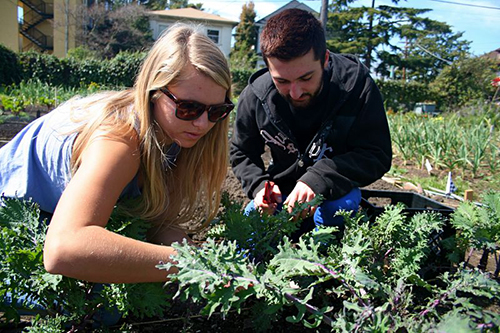
The Student Organic Garden on the corner of Virginia and Walnut streets is open for use by the campus community. (Photo courtesy of the Student Organic Garden Association)
While Berkeley is at “an all-time high” in its efforts to do outreach to students in need and to train faculty and staff to recognize their distress, “we need additional student and staff positions because the work isn’t going to get scaled unless we have team members to do the work,” says Canedo. “And we need funding for the resources we’re providing to students, like food, programming and emergency funds.”
Across the UC system, 48 percent of undergraduates and 25 percent of graduate students reported in a 2015 Nutrition Policy Institute survey that they are food insecure, meaning they can’t access adequate food due to a lack of money and other resources.
An estimated 9,000 undergraduates and 1,000 graduate students at Berkeley meet the criteria for CalFresh and can potentially qualify for a free debit card for groceries.
As food/basic needs co-chair of UC President Janet Napolitano’s Global Food Initiative, Canedo is co-producing a report on the basic needs of UC students systemwide and recently launched Berkeley’s new comprehensive Basic Needs Security website, a model repository of student resources.
“Basic needs security is a term all our UC campuses have been using for a year and a half now,” says Canedo. “It’s caught on, and now it’s being used across the country. Our students are talking about it with local, state and federal government leaders. It’s a large challenge in our community that we just can’t neglect.”